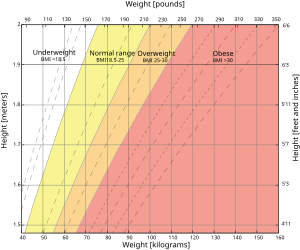Underweight
| Underweight | |
|---|---|
 |
|
| The underweight range according to the body mass index (BMI) is the white area on the chart. | |
| Classification and external resources | |
| ICD-10 | R62.8 |
| ICD-9-CM | 783.22 |
| MeSH | D013851 |
Underweight is a term describing a person whose body weight is considered too low to be healthy. The definition usually refers to people with a body mass index (BMI) of under 18.5 or a weight 15% to 20% below that normal for their age and height group.
A person may be underweight due to genetics, metabolism, drug use, lack of food (frequently due to poverty), or illness.
Being underweight is associated with certain medical conditions, including hyperthyroidism,cancer, or tuberculosis. People with gastrointestinal or liver problems may be unable to absorb nutrients adequately. People with certain eating disorders can also be underweight due to lack of nutrients/over exercise.
Underweight might be secondary to or symptomatic of an underlying disease. Unexplained weight loss may require professional medical diagnosis.
Underweight can also be a primary causative condition. Severely underweight individuals may have poor physical stamina and a weak immune system, leaving them open to infection. According to Robert E. Black of the Johns Hopkins School of Public Health (JHSPH), "Underweight status ... and micronutrient deficiencies also cause decreases in immune and non-immune host defenses, and should be classified as underlying causes of death if followed by infectious diseases that are the terminal associated causes." People who are malnutrative underweight raise special concerns, as not only gross caloric intake may be inadequate, but also intake and absorption of other vital nutrients, especially essential amino acids and micro-nutrients such as vitamins and minerals.
In women, being severely underweight as a result of an eating disorder, or due to excessive strenuous exercise can result in amenorrhea (absence of menstruation),infertility and, if gestational weight gain is too low, possible complications during pregnancy. Malnourishment can also cause anemia and hair loss.
...
Wikipedia
